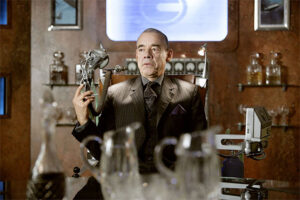Rise of the Cybermen/The Age of Steel in Perspective

David Selby takes a trip back to 2006 to look at the first Cybermen story of the revival.
On many occasions, I’ve defended the divisive Cyberman revival story for the new series, which is often slated by fans – particularly those who were fans of the classic Cyberman design.
Recently, I had the opportunity to re-watch Rise of the Cybermen/The Age of Steel. And, as with all previous viewings, I absolutely adored them. I’m up to the Series 2 finale now, and I can safely say that aside from Bad Wolf/Parting of the Ways (see my previous article
“Parallel world – and my Dad’s still alive…”
 For a sci-fi show, Doctor Who seldom explores parallel worlds. In fact, the last (and only other time) a parallel universe was ever featured on Doctor Who before Rise of the Cybermen was in 1970 serial Inferno, when the Doctor was thrown into a parallel universe where a drilling project had gone horribly wrong. Rise of the Cybermen actually inspired me to watch Inferno, which soon after became my second favourite classic serial.
For a sci-fi show, Doctor Who seldom explores parallel worlds. In fact, the last (and only other time) a parallel universe was ever featured on Doctor Who before Rise of the Cybermen was in 1970 serial Inferno, when the Doctor was thrown into a parallel universe where a drilling project had gone horribly wrong. Rise of the Cybermen actually inspired me to watch Inferno, which soon after became my second favourite classic serial.
Whilst the Pertwee classic was a tough one to rival, Rise of the Cybermen in particular excels in its depiction of the ‘alternate universe’; a world where everything is the same but slightly different. Something that writer Tom MacRae especially endeavoured to communicate was how precariously enticing this alternate reality was: as the Doctor described it, a “gingerbread house”. Whilst it’s a lot like our world, this other Earth is hazardous and alluring, and this is apparent throughout the whole episode.
I also admire MacRae’s attempts to experiment with the characters, their personalities and their motives in this story. What would Jackie Tyler be like without Rose? What would her relationship with Pete be like if he was still alive? How would Pete change with success? They’ve got more money than they know what to do with, but as the old saying says: money can’t buy happiness. Rose gave Jackie a reason to live. The scene where Pete reveals that he’s split up with Jackie evokes poignancy because it was expected by both Rose and the audience that they’d live a happy life together – here MacRae is testing audience expectations and composition of a familiarly harsh reality.
“Skin of metal… and a body that will never age or die. I envy it.”
 I firmly believe that this is the closest portrayal of the Cybermen to Kit Pedler’s original concept: the result of surgical implants and the horrific consequences of humanity’s most terrifying survival instinct. The mise-en-scène during Rise of the Cybermen was vastly superior to anything else I’d seen with the Cybermen before: short, blurry shots of them, bathed in a mysterious light, foreboding stamping feet, the piercing electronic voice from the darkness – whether it be direction, sound or lighting, the production team placed a lot of time into accentuating the raw mystery behind these new Cybermen, before exploring their power, philosophy and capacity for evil in the second episode.
I firmly believe that this is the closest portrayal of the Cybermen to Kit Pedler’s original concept: the result of surgical implants and the horrific consequences of humanity’s most terrifying survival instinct. The mise-en-scène during Rise of the Cybermen was vastly superior to anything else I’d seen with the Cybermen before: short, blurry shots of them, bathed in a mysterious light, foreboding stamping feet, the piercing electronic voice from the darkness – whether it be direction, sound or lighting, the production team placed a lot of time into accentuating the raw mystery behind these new Cybermen, before exploring their power, philosophy and capacity for evil in the second episode.
I extol MacRae’s ingenuity when it comes to his creative decision to retell the Cybermen’s genesis tale through the parallel alternative. This approach allows for some imaginative twists to the original, it is a different world and thus doesn’t undermine the classic series, and moreover opens up the possibility that the Cybermen could actually do some damage. Inferno was so powerful because all of the characters from the parallel universe were killed in the end – it stresses the potential danger of the drilling project. The same applies for Rise of the Cybermen/The Age of Steel: without doing any physical damage to our world, we see how society can be torn apart by this kind of technological revolution.
It’s this striking resemblance to the present day that I approve, as well. I’ve often likened the deeper message to Plato’s allegory; we’re seeing ‘reflections’; the technology that has worked, and which is made for good, but actually, it is dangerous, and could potentially decimate society, and John Lumic is the puppeteer; one of many who are fooling an easily deceived society. The original concept of the Cybermen were creatures with delusions of humanity, people who have been shaped unknowingly by technology, by surgical implants and cybernetics as I mentioned earlier, by false enlightenment, suggesting that scientific knowledge really isn’t what it’s cut out to be. It’s the ‘iPhone gone mad’ notion, and it’s quite a disturbing one. I liked the addition of the ‘stompy’ boots, because it shows horrific uniformity, a lacking humanity, and completely programmed life – not even a life; a half-life, because without free will, it’s not alive, is it? It’s a shame that McRae’s brilliant two-parter is so heavily overlooked, because it could be the catalyst of some very deep philosophical debates. I also like the idea that the Cybermen pity us for our pain – they can’t appreciate that it’s our most tragic days that define us and make us who we are now.
It’s interesting how the Doctor picks up on the fact that once the Cybermen have taken over, nothing will happen. And that’s exactly it. With no imagination, there are no further advancements; with no further advancements, the Cybermen will begin to regress. This industrial reform is its own worst enemy.
“I will upgrade only with my last breath…”
 John Lumic was one of Doctor Who’s finest supporting characters, and one of the adversaries with the most depth. He was driven solely by his impending death. That’s why the Cybermen progressed quicker in that world; Lumic was determined and didn’t have long left. He was desperate, impulsive and callous – his bitter fortitude conveyed by his diminishing human traits – for example, when other characters joke, Lumic never laughs. It separates him from the rest of mortality.
John Lumic was one of Doctor Who’s finest supporting characters, and one of the adversaries with the most depth. He was driven solely by his impending death. That’s why the Cybermen progressed quicker in that world; Lumic was determined and didn’t have long left. He was desperate, impulsive and callous – his bitter fortitude conveyed by his diminishing human traits – for example, when other characters joke, Lumic never laughs. It separates him from the rest of mortality.
I love the idea that whilst Lumic had planned all of this, he was too scared to upgrade. And hence he had the best comeuppance: his own invention destroyed him.
“There’s no choice, Doctor. It’s got to be done…”
What a clever ending The Age of Steel had. The Cybermen weren’t blown up by love, or killed by the Doctor – they just got their emotions back. It was a very tragic resolution to the episode, and quite distressing in parts, but was done just right for family viewing. I’m glad MacRae spent a little time focusing on the morality of the actions (“I think it would kill them. Can we do that?”/”We’ve got to. Before they kill everyone else…”) beforehand, too; it gave the story some realism.
“I’m not an idiot! Have you got that?”
 The thing that I love most of all about this story is Mickey’s magnificent character development. It’s all quite sudden, actually; by School Reunion, he’s racked up the confidence to travel with the Doctor, and then two stories later, he’s living his own life.
The thing that I love most of all about this story is Mickey’s magnificent character development. It’s all quite sudden, actually; by School Reunion, he’s racked up the confidence to travel with the Doctor, and then two stories later, he’s living his own life.
It stems from the fact that Mickey knows he’s the TARDIS gooseberry, and that’s quite a sad thought. There are a lot of brief shots where you see Mickey looking at the Doctor and Rose, almost envying what they have. And as Mickey explains to the Doctor, he’s always going to put her first. He’s tired of being the tin dog, and you can hardly blame him.
There are a number of scenes where MacRae plays with the Doctor and Mickey’s dynamic: on the hill scene, Mickey surprises the Doctor with his newly-found confidence, but the Doctor grows to respect this later on.
Would you do the same as Mickey? I think I would. His decisions are fully merited – I know that if one of my loved ones was still alive out there, I’d stay with them. That’s what’s actually quite lovely about the notion of a parallel Earth. As Mickey says goodbye, Rose finally comes to realise how much he actually meant to her, but knows that she’ll still stay with the Doctor. That’s the pinnacle of this unlikely TARDIS trio.
Conclusion
I haven’t had the time to focus on everything – I could have gone on about the separate ‘preachers’ and how their sacrifices have shaped them, or Pete Tyler’s frankly superb role in the episode, but I think you get the gist by now. I really love this story. It’s deep and poignant in meaning and grand and apocalyptic in scope. It’s hugely underrated, and I think even Gaiman will struggle to rival it with Nightmare in Silver.








